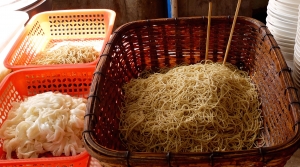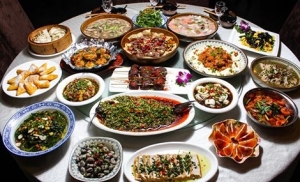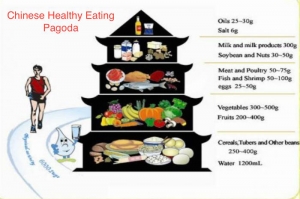By Jennifer Roman, Teacher in Wuhan
Are you interested in maintaining your health when moving to China? Or are you living in China and looking for ways you can become a healthier version of yourself?
Well, keep reading – I’ve collaborated the views of other expat teachers living here and combined it with my own experience and research to assess what are some difficulties are to staying healthy here. I’ve added some useful tips. Also, I’ve added what I think to be the healthiest aspects of the Chinese lifestyle.
I wish to provide you with awareness and hope that the suggestions from other teachers and myself can be of somewhat use to you in your Chinese life.
It’s Carbolicious
Traditionally, the Chinese diet is high in carbohydrates – it has been the fuel of this almighty nation since ancient times.
Barrels of steamed white rice and oodles-upon-oodles of noodles are in abundance and it is completely integrated into Chinese culture. There are more varieties of these staples here than any one person could try in their lifetime. It is common for carbohydrates to play a primary role in all three meals seven days a week.
Unfortunately, adjusting to follow this higher consumption of carbohydrates can have its drawbacks. Firstly, it can lead to sharp spikes and spirals in our blood sugar levels leading to feelings of fatigue and grogginess. Next, of course without being active and doing sufficient exercise, all this extra fuel can turn to stored body fat. However, there are some ways we can avoid an excessive intake of these starches.
Tips:
1. Sometimes ask for no rice – you might get some strange looks! “Bu yao mi fan, xie xie.”
2. Go out of your way to replace the starchy high GI carbohydrates (rice, noodles, potatoes) with low GI choices such as whole grains (oats, buckwheat, brown rice), legumes (beans, chickpeas, tofu) and vegetables.
3. Exercise more to use the extra energy consumed.
4. Avoid sugary beverages and replace with tea or water.

Noodles (and rice) are the fuel of the nation.
Too Oily! Tai You Ni!
Chinese cuisine often has a high-oil content. On the whole, unlike Westerners, Chinese are very happy to sacrifice nutrition for taste. Chinese are obsessed with deliciousness – their cuisine on all levels is designed to combine specific elements of smell, colour and taste to produce a spectacular piece of edible art. Oil and salt are often added to enhance the flavours of a dish.
In addition, their super high-heat cooking methods require a lot of oil to prevent burning and sticking.
Chinese don’t often cook with too much oil in their homes – it can be somewhat viewed as a luxury- therefore they don’t have a problem eating it in high quantities outside of the home. Therefore, when eating out, oily foods can be unavoidable.
Teach English In China teacher Tom said a Chinese diet is not the best.
“Here in Suzhou anyway, they use huge amounts of oil in everything they cook. I mean even if you buy water dumplings here there is oil in it.” he said.
Although it’s delicious, eating too much saturated fat can lead to weight gain and is linked to heart disease from the excess cholesterol it puts in the bloodstream. So what are some ways to avoid this?
Tips:
1. Cook for yourself to monitor and control what you eat. When the Chinese cook they go by their rules! Warning: it probably won’t taste as good.
2. To get the best of both worlds – share that street snack with a friend.
3. As high-oil foods are an issue for many Chinese too, ask a Chinese friend to suggest the best places around to enjoy non-greasy foods.
4. Change the cooking method – switch from fried to boiled!
5. Replace the saturated unhealthy oils with unsaturated healthier fats such as olive oil, nuts, seeds and avocado.
Air Quality
Challenges to exercising can occur when moving to a new place – and relocating to China is no exception. The pollution became a factor on your desire to exercise when winter rolled in and the air quality worsens.
“In England, I would go jogging but in Suzhou I’ve avoided it a lot because of the pollution. It is noticeably harder to jog in China” said Tom.
James said the pollution has affected his ability to do exercise outside.
“Nine tenths of the time I check the air quality, it says to avoid prolonged outdoor exertion, so I do. The times I have played football or something outside it usually leaves me with a sore throat and irritated sinuses,” he said.
The benefits of exercising on physical and mental wellbeing are known by most. The grey environment produces a challenge to continue your regular activities outdoors. Here are some useful suggestions to try and work around this.
Tips:
6. Home workouts such as bodyweight workouts, “snowed in,” indoor workouts or yoga. Investing in simple equipment such as dumbbells, ab rollers and skipping ropes are just some which have been suggested.
7. Play your favourite sports but just in indoor facilities.
8. Gyms are increasing in popularity in China! Often as good as back home but cheaper.
9. Go for a nice long walk and explore a new area with your pollution mask.
10. Try a new sport. Mixed martial arts, anyone?

Your exercising habits don’t have to stop when moving to China
Indulging
Over-indulging is another challenge in China. Unhealthy foods, drinks and comfort snacks are generally more affordable in China. Also, they are usually more available than their healthier counterparts.
What’s more, the opportunity to over-eat at a restaurant is common because Chinese tend to politely order more food than needs to be eaten while us Westerners politely try to eat all the food in front of them.
Alcohol consumption should not being ignored either as there are often ample opportunities to go out for a drink or four.
Wuhan-based Teach English In China university teacher Luke said it was difficult to resist temptation.
“Dining out in China is a recurring luxury where food is ordered by the tonne and if it is front of me it will get devoured,” he said.
“Like me and many other British people, we tend to indulge and binge on unhealthy amounts of alcohol several times a week.”
The impact of over-consumption on our wellbeing is obvious – the disadvantages of a high-carbohydrate and high-fat diet have already been outlined. Consuming too much alcohol consistently of course can have the long term effects of organ damage and links to cancer, however, the shorter term effects on our wellbeing can include a weakened immune system, disruptions to sleep, impairments to make healthy decisions, dehydration, lowered mood and painful morning-afters. The solutions to this are not new but maybe can serve as reminders:
Tips:
11. Self control and being strong against peer pressure!
12. Find healthy snacks as opposed to high-processed, high-sugar or high-fat ones.
13. Cut down on alcohol by ordering non-alcoholic drinks, drinking slower and or drinking less.
14. Think very creatively to meet friends in places other than bars.
15. Know you’re not expected to finish everything in front of you.

Chinese hosts want you to eat as much as possible.
Ting Bu Dong
Moving to an unfamiliar city in a country where you don’t speak the language can provide challenges to creating a healthy diet. Being new to a city makes it difficult to find healthy restaurants and local markets. Most of us are essentially illiterate here which makes it tricky to know what is on a menu, ask about certain dishes or request a healthier option.
Nicolle, a Teach English In China teacher in Tongling, has experienced this first hand.
“Language barrier in restaurants is a factor. I find that my options are limited when I’m ordering food because I can’t read Chinese,” she said.
“I survey my options and I end up eating the same thing all the time because it’s what I know. Sometimes when I’m literally tired of trying to explain myself I usually go to the restaurant I know, look at the Chinese menu and point, hoping for the best”.
This lack of knowledge is a challenge to staying healthy in China because it limits our ability to see all our options, let alone healthier ones. There are a few tactics to open up our options.
Suggestions
16. Visit restaurants with Chinese friends – they can help order foods which are healthier
17. Close the information gap about the local area by asking local students or teachers
who also live in the area.
18. Learn key words of foods you like to ask the people who work there. Alternatively – bring up the words on Chinese translation app, Pleco.
19. Scout the restaurant before you order to see if someone’s eating something you could fancy.
20. Take photos of food you like to show at other times where you order!
Where’s the meat?
Significantly smaller portions of meat in Chinese cuisine can prove to be a difficulty for some of us.
Maintaining or increasing muscle mass can often be on the mind of Westerners wanting to be healthy. Consuming a sufficient amount of protein is required to reach these goals. For a few reasons, this can be prove a little difficult in China.
Firstly, Chinese traditionally have a vegetable-dominant diet as while Westerners traditionally have an animal-dominant one. Throughout history while they were harvesting vegetables, for one reason or another, we were herding livestock. This can help explain why Chinese base their meals around vegetables while we base our meals around meat. Does this further explain why the Oriental race tend to be shorter with less muscle mass? We have an innate need to eat more protein because we physically need it.
Secondly, we eat more protein because our society favours us to have a muscular or toned figure. This is different to Chinese society, where often a slim figure is desired and deemed attractive for both for males and females.
Living in a country where meat isn’t so important can provide a challenge to staying healthy if we indeed view it as a key to our health. So how can we boost the protein in our diet?
Suggestions
21. Cook at home! Chicken breasts are not expensive. Tofu is another cheap alternative.
22. Buying supplements such as protein powder. Check Taobao!
23. Ask for extra portions of meat when you eat out.
24. Find other high-protein foods such as milk, soy milk, eggs, tofu, yogurt, beans, chickpeas, nuts and nut-butters.
The Healthy Chinese Lifestyle
So, the Chinese lifestyle can appear to be very unhealthy at first but they are indeed a very health-conscious society.
Confucian philosophy is evident in the eating habits of many Chinese. He preached segmented meal times, not over-eating and limiting alcohol. These guidelines are officially in the Chinese healthy-eating food pyramid which is taught in the national curriculum in Middle Schools. Another belief is that vegetables (and meat) should be well cooked – to be easier on the body to digest. There are no salads or raw vegetables in the traditional Chinese diet.
Chinese aren’t inactive; exercise is a core part of many people’s lifestyles. University students have morning exercises, fitness tests and PE classes which is unlike Western students in universities. The middle aged and elderly keep active too and it’s common in summertime to see groups of people dancing in time in public squares to a speaker box of music (they are very welcoming if you want to join in!). People leave their apartments and spend time in parks strolling around, playing lights sports, or practicing tai chi. This active culture is refreshing in compared to the often sedentary lifestyles seen in Western countries.
Also, the Chinese diet is often criticised for having too much oil – but this often just the case of restaurant or street foods. Funnily enough, Western cuisine is often criticised in China for it’s high oil content because fast food – such as fried chicken, fries and hamburgers – are often the definition of Western cuisine. Either way, in both societies, home-cooking uses less oil. Also, in both societies, often people prefer unhealthy foods as a treat when we eating out. The consequence of this is that we can have an unhealthier diet if we eat out all the time and, alternatively, we will have a healthier low saturated fat diet if we cook for ourselves.

The healthy eating guidelines of China and UK show many similarities

There is also a strong tea-drinking culture – although they may not drink much water (or tea) during meal times. Tea-flasks are easily available and are a common possession for the average Chinese. Train stations, schools and workplaces usually provide hot water machines for people to fill up their tea-flasks. Since ancient times, tea has been used medicinally, and nowadays science continues to provide positive reasons for its consumption. The anti-inflammatory and antioxidant properties of tea has been linked to lower risk of cardiovascular disease and Type 2 diabetes. In addition, tea – especially green or oolong tea – aids weight loss.
Where there’s a will there’s a way.
There are some similar and different views of what it means to be healthy between the two culture and so I really hope you can take the best of both ideologies and use them to your advantage.
Although it can be challenging, if health is a priority then there no limit to how healthy you can be here. While there are some foreigners who have had challenges here with regards to different aspects of health, there are others who have felt healthier than in their home country.
So, these are my Tips for Staying Healthy in China. I hope this has provided you with some awareness of potential challenges you could face when moving here, or more insight if you are already an expat living here!
More so, I hope these suggestions can be of practical use or at least can provide you with a platform to think of other creative ways to maintain your health here.
Ready to explore China? Check out our program here.


Leave A Comment
You must be logged in to post a comment.